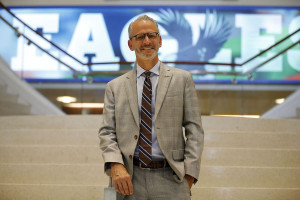A Message from the President
Dear Mary Washington Community,
In an effort to enhance communication on campus, I am beginning a regular Message from the President that will explore issues of importance at the University.
As recent revelations about state leaders suggest, the Commonwealth and country still have a lot of work to do in confronting its painful past regarding race. UMW must not be afraid to deal with this issue as it relates to our past, present, and future.
Shortly after my arrival at UMW in 2016, I established the President’s Task Force on Diversity and Inclusion. The committee, made up of faculty, staff, and students, was charged with gauging the campus climate, developing more effective reporting mechanisms for bias incidents, and determining the means by which the University could recruit and retain a diverse student body, as well as a more diverse faculty and staff.
Amid the work of this task force, the university community developed a Strategic Vision for Mary Washington that included the goal of creating a diverse and inclusive community as a critical and necessary component of our commitment to academic excellence. The recommendations of the task force provided a road map toward meeting this goal.
Over the last year and a half, we have made great strides to implement these recommendations. One of the most tangible results has been the thoughtful revision of UMW’s Statement of Community Values as well as its Statement of Guiding Principles on Diversity and Inclusion. Again, this sensitive and time-consuming work was developed by our own community members – a group of committed students, faculty, and staff. As a result of their outstanding work, I can now proudly say that the University of Mary Washington ASPIREs to the following values:
Accountability
Scholarship
Personal and institutional integrity
Inclusive excellence
Respect and civility
Engagement
Another recommendation of the task force was to ensure that the campus environment reflects our commitment to diversity. Toward that end, I commissioned at the beginning of the 2017-18 academic year a Campus Environment Presidential Ad Hoc Committee to ensure that the physical environment on our campuses better celebrates the diversity and values of our UMW community.
This campus environment committee, chaired by Associate Professor of Historic Preservation Michael Spencer, undertook a highly deliberative, measured, and deeply considered approach as they reviewed displays and representations. The project employed scholarly methodology to critically assess what was of concern, to whom, and how to address the issues while preserving the history of UMW. In November, Dr. Spencer presented a preliminary report to the Board of Visitors (BOV), and yesterday the committee approved a set of recommendations for the BOV and University to consider.
The committee will first disseminate its report that includes implementation goals for 2019, as well as goals to achieve during the next five years. After the release of its recommendations, the committee will hold focus groups this semester to gather more data to allow for an efficient and impactful prioritization of the issues to be addressed. The committee will then hold public forums during the fall of 2019 to discuss the recommendations as well as solicit community feedback.
Some of the goals in the report are uncontroversial and should readily gain community consensus. Implementation can begin on those in short order. Others might spark debate that cuts to the core of who we are as a learning community. These are important and necessary conversations that must occur, and I look forward to listening to all of your voices. These recommendations are an opportunity to better promote the contributions of our increasingly diverse community and create a fully welcoming environment for all students, faculty, and staff.
The work ahead of us will not erase our history, as painful as parts of it might be, but we will face it directly and own it. As a historian and an educator, I know that we must understand the past in all of its nuance and complexity to learn and move forward.
I cannot thank the members of the UMW community enough for your tireless contributions to improving our campus environment, speaking up about injustices, and engaging in courageous conversations. As a liberal arts institution, UMW’s role is to grapple with complex societal issues.
In the words of Martin Luther King, Jr.: “Whatever affects one directly affects all indirectly.” We are all in this together.
Sincerely,
Troy
